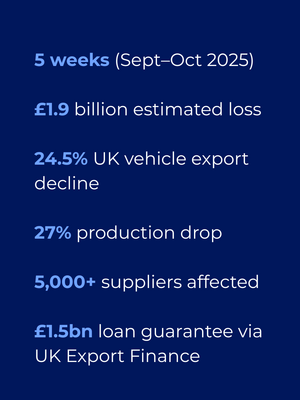13 November 2025
In September 2025, Jaguar Land Rover (JLR) became the epicentre of a cyber crisis that reverberated across the UK manufacturing sector.
The breach, which forced the shutdown of JLR’s Solihull, Halewood, and Wolverhampton plants for five weeks, resulted in an estimated £1.9 billion in direct losses and a 27% drop in UK car production, the sharpest monthly decline since 1952. But the true cost of the attack extended far beyond JLR’s factory gates.

More than 5,000 suppliers, ranging from Tier 1 automotive manufacturers to logistics and service providers, were affected. Many faced delayed payments, cancelled contracts, and severe cash flow disruption. The incident exposed a critical vulnerability in modern supply chains: the financial fragility that arises when a single anchor client experiences operational paralysis.
The JLR breach triggered a “domino effect” in trade finance. When a major buyer halts operations, suppliers often face delayed receivables, which in turn affects their ability to pay their own creditors, employees, and service providers. This cascading impact can quickly evolve into a systemic liquidity crisis, especially for SMEs with limited reserves.
The role of Trade Credit Insurance
In this context, trade credit insurance becomes not just a financial tool, but a strategic safeguard. It protects businesses from losses due to customer insolvency or protracted default, ensuring that receivables are covered even when clients cannot pay.
Trade credit insurance offers several key benefits in times of disruption:
-
Cash Flow Protection: Ensures continuity of operations even when payments are delayed or missed.
-
Risk Intelligence: Insurers provide early warnings on buyer risk, helping businesses adjust credit terms proactively.
-
Financing Advantage: Banks often view insured receivables more favourably, improving access to working capital.
-
Market Confidence: Enables businesses to extend credit and enter new markets with reduced exposure.
The JLR cyber breach has become a defining moment for UK manufacturing. It highlights the need for robust digital infrastructure, diversified supply chains, and financial resilience. For procurement leaders, CFOs, and business owners, the lesson is clear: protecting receivables is essential. As cyber threats grow more sophisticated and economic volatility persists, trade credit insurance offers a vital buffer against the unexpected.
Contact Verlingue today to explore the ways in which Trade Credit Insurance can safeguard your business.
Further Reading:
JLR Cyber Attack: The Lasting Impact on Suppliers
Navigating the Storm: Overcoming Supply Chain Challenges in UK Manufacturing


